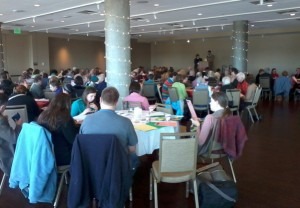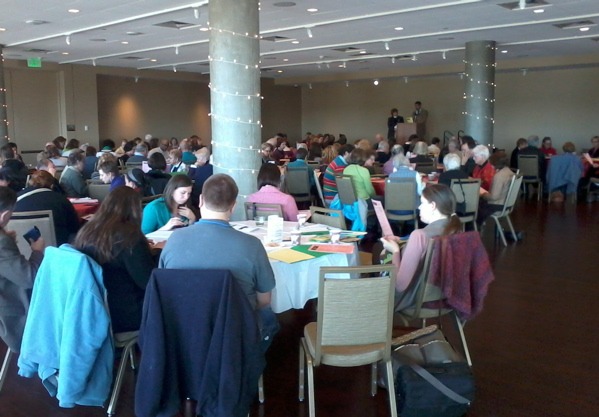
Yesterday, a friend and I joined about 150 local clergy and community leaders at the Faith Advocacy Day organized by Lutheran Advocacy Ministry-Colorado. Co-sponsors of the gathering included the Jubilee Ministry of the Episcopal Diocese of Colorado, the Colorado Council of Churches and Colorado Interfaith Voices for Justice. The half-day event focused on how people of faith can get involved in the political process on behalf of those who cannot advocate for themselves.
Here’s some food for thought from the day’s talks and discussions:
Allan Bjornberg, Bishop of the Rocky Mountain Synod of the Evangelical Lutheran Church of America, provided a theological reflection during which he made a telling statement: “People living in a system of anxiety and fear don’t have time and energy for the common good.” The job of our political representatives, he said, is to work for the common good, not just the good of one side of the population. He later applied that same standard to yesterday’s gathering, “If we give the impression that you have to be a liberal Democrat to be in this room we’re failing.” Referring to the example of the Exodus story from the Hebrew Scriptures, he said the job of the faith community is to allow the generosity of God to redefine our reality, in part by intervening in societal structures on behalf of widows, orphans, immigrants and others in need. We need to find a way to combine the best of the liberal and conservative perspectives for the common good, not to win an argument but to work together, Bjornberg said, and it’s in faith communities in particular where “the grace of God holds us together” despite our possible political differences of opinion.
Miguel de La Torre, Professor of Social Ethics and Latino and Latina Studies at the Iliff School of Theology in Denver, spoke about the need to change the oppressive systems and structures that injure, ignore or abuse the most vulnerable people within our society. Referring to what some theologians have called God’s “preferential option for the poor,” he said, “This is the God who takes sides…who stands against the pharaohs of this world.” Echoing the words of the prophet Micah, de la Torre said, “To know God is to do justice. If I do not do justice I am proclaiming my ignorance of God,” and he closed with a provocative reflection on Jesus’ parable of the sheep and the goats from the Gospel of Matthew, “You cannot get into heaven without a letter of recommendation from a homeless person.”
During the question-and-answer session that followed de la Torre’s talk, Randle Loeb, one of our tablemates, made a passionate plea for advocates to listen to the needy and include them, from the beginning, in the discussions and initiatives designed to help them. Loeb serves as secretary and community representative of the Metro Denver Homeless Initiative and also represents the People’s Advocacy Council. As someone who has been homeless himself, Loeb knows the best way for middle-class advocates to overcome the limitations of their privilege is to truly see those they are attempting to help as equals and to attempt to identify with them in meaningful ways. I agree, although I have found in my work that the practice of equality in on-the-ground justice work (and charity work, for that matter) is not nearly as common as the practice of talking about it in abstract terms.



I totally agree! It is important to honor people’s preferences and believe when they express needs.
Someone in my area told of a faith-based initiative to intervene in the lives of families who are ‘almost homeless.’ But the initiative involves calling them ‘almost homeless’ and asking the family to subject themselves to a program. How humiliating! How would one broach that conversation, “Excuse me, you appear to be extremely poor and I was thinking that you are doing such a poor job of providing for your family that you may soon be homeless. May I help you?”
So, yes, I like seeing others as equals. Yay for the summit. Sounds beneficial.